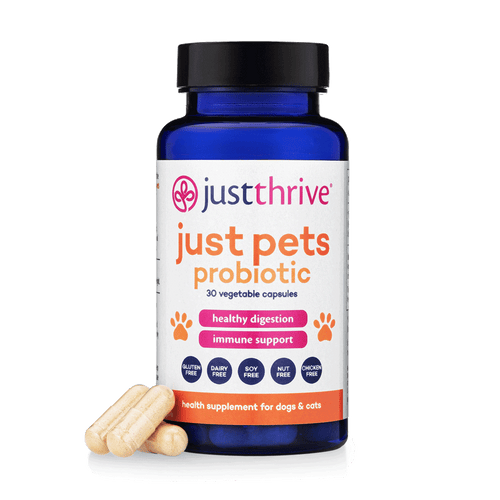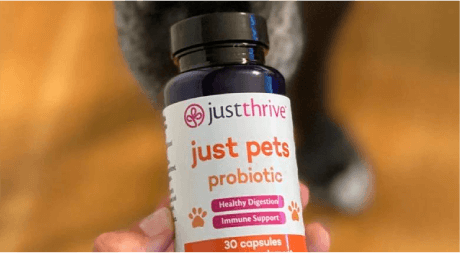How an unbalanced gut destroys your pup’s comfort
Has your once energetic dog been dragging on walks? Avoiding stairs? Staying on the floor when he used to love hanging out with you on the couch?
If your dog has painful joints, he won’t want to move around as much.
And when your pup’s in pain, you want to do everything you can to ease it.
Maybe you feel like you’ve tried all the holistic options, but nothing really seems to work…
Maybe you feel wary putting your dog on pain medications that could cause unwanted and even harmful side effects.
But you may be surprised to find out that there’s another option that you may not have considered…designed to help your dog feel better from the inside out.
Let’s start by exploring the signs and causes of joint pain in dog’s—with one big one that you might not expect.
Signs Your Dog’s Dealing with Joint Pain
When your dog is living with painful joints, it can be hard to tell at first. That’s because there are many signs that could show up, and your dog may not show the same signs every day.

Some of the most common things you’ll see if your dog is suffering from sore joints include:
- Trouble getting up and down
- Limping
- Moving stiffly
- Avoiding stairs
- Walking slowly
- Cutting walks short
- Refusing to jump on or off furniture
- Trying to avoid being touched in some spots
- Excessively licking their joints
- Unusual aggression toward people and animals
If your dog is exhibiting any of these behaviors, they’re telling you that they’re in pain. And they’re counting on you to help.
Main Causes of Dog Joint Pain
Your dog’s joint pain is probably due to a combination of causes—most cases are. There may be a triggering event, like an injury, but other factors can just develop over time.
You can probably guess the most common contributing factors such as:
- Body weight
- General activity level
- Surgical history
- Past injuries or infections
- Diet and nutrition
- Wear and tear as your dog ages
But one of the main causes is much less obvious, even though it plays a surprisingly big role in your dog’s joint function and comfort.
Leaky Gut Undermines Your Dog's Joint Comfort
Your dog’s intestines are lined with a protective mucosal barrier. This defensive barrier acts like a filter that lets nutrients into the bloodstream and keeps bacteria, parasites, viruses, and toxins out. It’s a crucial part of your dog’s immune system, and it affects a lot of immune functions, including inflammatory responses.
Unfortunately, your dog’s gut barrier is highly sensitive and vulnerable to things like:
- Antibiotics and other medications, like NSAIDs and steroids commonly used to treat joint pain
- Artificial or highly processed foods
- Pesticides found in soil, water, and air
- Household cleaners
- Gut infections
- Dysbiosis, an overgrowth of harmful bacteria in your dog’s gut
When your dog’s gut barrier gets damaged, pathogens and toxins can leak out; that’s leaky gut. Those harmful particles force their way through the broken gut lining and into your dog’s circulation.
Your dog’s immune system responds to those unwanted substances in an effort to defeat them and keep your dog healthy. But this can result in a system-wide inflammatory response that triggers other problems… like joint tenderness.
So getting that leaky gut under control can give your dog’s joints the break they need so your best friend can walk, run, and jump on the sofa happily.

Dysbiosis Linked to Joints
Dysbiosis does more than cause leaky gut. It can also add to your pup’s joint distress more directly.
Your dog has a gut microbiome, and it plays a starring role in their overall health.[1]
When that gut microbiome is healthy and balanced, it contains trillions of diverse beneficial probiotic bacteria along with some harmful pathogens. Those probiotic bacteria produce dozens of helpful compounds including:
- Essential nutrients, like B vitamins
- Amino acids
- Protective short chain fatty acids (SCFAs)
A healthy gut directs balanced immune responses—not overreacting or under-reacting—and that includes healthy inflammatory responses.
But when the gut slides into dysbiosis, pathogens greatly outnumber probiotic bacteria. As the pathogens multiply, the toxins they produce attack the gut barrier and cause leaky gut.[2] Those pathogens also trigger imbalanced immune system responses, and not just in your dog’s gut. They also suppress all the healthy compounds probiotic bacteria would normally produce, undermining your dog’s health and comfort…including their joints.
In fact, a veterinary study found that gut microbiomes in dogs with joint discomfort looked completely different than healthy dogs with healthy joints.[3]
On the bright side, you can take proactive steps to balance your dog’s gut microbiome to support healthy, comfortable joints with specially formulated probiotics.
Don't Give Your Dog Probiotics for Humans
When it comes to probiotics, the ones formulated for people won’t work for your dog. They need probiotic supplements specifically formulated for a dog’s gut microbiome.
Studies show that giving proper probiotics to dogs helps maintain a well-balanced gut microbiome, supports healthy gut barrier function, and promotes healthy immune system function.[4,5]
A pet-focused spore probiotic supplement showed positive results in a clinical trial of dogs experiencing diarrhea and vomiting. Researchers tested this special supplement containing canine-friendly probiotic strains: Bacillus subtilis HU58™, Bacillus licheniformis SL‐307, and Pediococcus acidilactici. They gave the supplement to 11 dogs—some healthy, some with GI distress—for 30 days…and the results were overwhelming:[6]
- GI issues were dramatically decreased or disappeared
- Leaky gut markers dramatically decreased
- Flatulence was reduced in healthy dogs
- No healthy dogs experienced adverse symptoms
Pet probiotics maintain healthy balance in your dog’s gut microbiome to support whole body health and balanced inflammatory responses.[7]
Keep Your Dog Comfortable with Just Pets Probiotic
Just Pets Probiotic contains Bacillus subtilis HU58™, Bacillus licheniformis SL-307, and Pediococcus acidilactici, three strains of probiotics proven effective for supporting your dog’s gut.
Adding just one capsule to your dog’s food daily can help:
- Maintain healthy balance in the gut microbiome
- Support healthy gut barrier function
- Support healthy immune responses
And if you’re feeling unsure about trying Just Pets, we can help with that.
EVERY Just Thrive purchase is covered by our Bottom of the Bottle, 100% money back guarantee.
So you can try Just Pets to see if it works for your dog… and we’re confident it will when used as directed.
But if for any reason you notice a difference, simply ask for a full product refund. Any time. Even if it’s been 3 months or 3 years. Even if the bottle is empty! You’ll get your money back any time, no matter what.
>> Try Just Pets, 100% RISK FREE, and save 30% on your first month’s subscription with code SUB30.
Sources
- Pilla R, Suchodolski JS. The Gut Microbiome of Dogs and Cats, and the Influence of Diet. Vet Clin North Am Small Anim Pract. 2021 May;51(3):605-621.
- Pilla R, Suchodolski JS. The Role of the Canine Gut Microbiome and Metabolome in Health and Gastrointestinal Disease. Front Vet Sci. 2020 Jan 14;6:498.
- Cintio M, Scarsella E, Sgorlon S, Sandri M, Stefanon B. Gut Microbiome of Healthy and Arthritic Dogs. Vet Sci. 2020 Jul 14;7(3):92.
- White R, et al. Randomized, controlled trial evaluating the effect of multi-strain probiotic on the mucosal microbiota in canine idiopathic inflammatory bowel disease. Gut Microbes. 2017 Sep 3;8(5):451-466.
- Yang Q, Wu Z. Gut Probiotics and Health of Dogs and Cats: Benefits, Applications, and Underlying Mechanisms. Microorganisms. 2023 Sep 29;11(10):2452.
- Matei MC, et al. Natural Endotoxemia in Dogs-A Hidden Condition That Can Be Treated with a Potential Probiotic Containing Bacillus subtilis, Bacillus licheniformis and Pediococcus acidilactici: A Study Model. Animals (Basel). 2021 May 11;11(5):1367.
- Khosravi M, Avizeh R, Zayerzadeh A, Gharibi D, Razijalali M. Effect of Bacillus subtilis and Bacillus coagulans spores on induced allergic contact dermatitis in dogs. Vet Med Sci. 2024 May;10(3):e1410.












